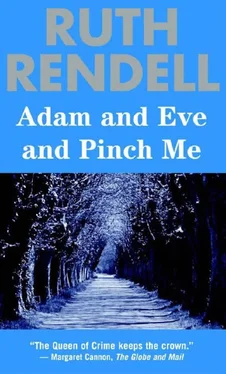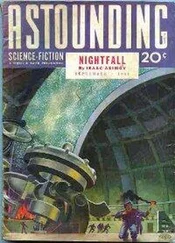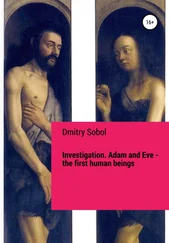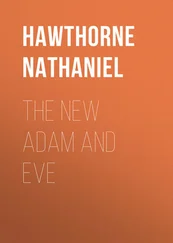“It is not!” She began sobbing and laughing at the same time. “It’s not, it’s not!”
“Michelle, stop it. I’ve had enough.”
She looked up at him, the tears streaming down her face. “And now she’s made us quarrel. We never quarrel.”
Fiona had returned to work on the previous Monday. People said how sorry they were about Jeff, but those who couldn’t remember his name referred to him as “your friend,” and Fiona thought this reduced him to the status of someone she’d happened to know at college. But she faced more curious glances and inexplicable silences than she would have done if Jeff had died of cancer or a heart attack. Murder marks its victim’s loved ones forever. Fiona knew her name would never again be mentioned among acquaintances without some qualifying phrase defining her as the woman “who lived with that chap who was murdered in a cinema.” Added to this was her bitter regret that she’d mentioned the Jarveys’ names to Violent Crimes. She no longer knew why she had and was driven to the conclusion that, as is often the case in these circumstances, she had come out with it because she had nothing to say, knew nothing, and could think of no real help to offer.
Michelle’s declaration of forgiveness hadn’t been accompanied by much warmth. This quiet, sad woman wasn’t the affectionate and demonstrative maternal creature she’d known, but subdued, retired into herself. Fiona had been into the Jarveys’ house three times since Sunday’s contretemps, so often, she now believed, in the ever-renewed hope that this time Michelle would have changed back into her familiar self, but though perfectly courteous and hospitable, she never had. This Friday afternoon Fiona was there again, using the back door to demonstrate an intimacy she desperately wanted to re-establish. And for a moment it looked as though she was approaching it, for Michelle came out to meet her and kissed her cheek.
Matthew’s manner seemed heartier than usual. It was Michelle, not he, who generally offered her a glass of wine. He fetched a bottle he’d had on ice, filled a glass for her and one for his wife. To her dismay she saw that Michelle’s eyes had filled with tears. “What is it? Oh, what is it? If you cry you’ll have me crying too.”
Michelle made the effort. “The police were here this morning. They don’t believe we were where we said we were that-that day. Someone saw a car like ours parked near the cinema. They want us to prove we were up on the Heath and we-we can’t, we can’t. We’ll never be able to.”
“Yes, you will. I’ll help you. It’s the least I can do. I can’t say I saw you there because the people in my office have already told them I was there till five. But I can find someone who’ll say it. I know someone-I mean, I know her well-who lives in the Vale of Health, and she’ll say you were there, I know she will. She’s just the sort of person who’d go to the police and tell them she’d come to offer evidence to support your story. Let me do it, please. I know it’ll work.”
Michelle was shaking her head, but Matthew had begun to laugh as if he hadn’t a care in the world.
Because he was holding his appointments in Toneborough on Saturday morning instead of Friday, Jims had postponed his constituency by twenty-four hours. In spite of an announcement of his marriage appearing in Thursday’s newspapers and the evident loss of police interest in him as a murder suspect, a good many of his fellow Conservatives in the Commons still cold-shouldered him. But the chief whip had said nothing more. That morning, the leader had nodded to him and even managed a slight smile. Jims was beginning to be confident that the people who mattered believed he’d been ignorant of his wife’s marital status when first he married her.
His drive down to Dorset was uneventful. All the roadworks had been completed and the cones and speed limit signs taken away. He reached Casterbridge in time to have a reconciliation lunch with Ivo Carew. Ivo’s sister Kate joined them for a drink and had a good laugh over a little bit of help the two of them, with Kevin Jebb, had given Jims on the previous day. Jims spent the afternoon visiting a retirement home, housed in a neo-Gothic mansion, where elderly gentlefolks of his own political persuasion ended their days in luxury suites. There, he talked to each resident in turn, toured the library and the film theater, and made a little speech-not to encourage them to vote Conservative, which exhortation would be unnecessary, but to vote at all, and he assured them of the comfortable transport available to take them to the polls. Before they sat down to their four-course dinner, he drove to Casterbridge station on the Great Western line, where he picked up Leonardo off the London train.
This was indiscreet. He’d never done it before, but he told himself no one could possibly find out. Of course they wouldn’t dine out together. Jims had brought a cold chicken, a game pie, some asparagus, and a livarot with him. Fredington Crucis House was always plentifully stocked with drink. By the time he got home the cheese was stinking up the car, for it had been a warm day, but this only served to make them laugh companionably. On the following afternoon, after Jims’s appointments were over, they thought they might drive down to Lyme, where Leonardo, a Janeite, wanted to renew his acquaintance with the spot from which Louisa Musgrove jumped off the Cobb.
There was no need to be in Toneborough the next morning until ten-thirty, so they stayed in bed till nine and would have stayed later still but for sounds from outside which alerted Jims. Leonardo slept on. He was accustomed to hearing traffic noise from his bedroom, to voices shouting, taxi engines pulsing, and lorry drivers applying squeaky brakes. So was Jims but not here, not in the grounds of Fredington Crucis House where, if anything awakened him, it would be birdsong. He sat up and listened. Mrs. Vincey’s radio? But no. He’d expressly told his cleaner not to come. Besides, the noise was coming from outside. It was a mingling of voices with a crunching on the gravel drive. A car door slammed. Jims got up, put on a dressing gown and went to a window. The floor-length curtains were drawn but there was a gap perhaps half an inch wide between them. He put his eye to the gap and leaped back with an exclamation. “Oh, my God.”
Leonardo stirred, turned over, muttered sleepily, “What is it?”
Without replying, Jims threw off his dressing gown, pulled on the jeans he’d changed into the night before and a dark sweatshirt. He went upstairs to the second floor where, at these smaller windows, the curtains remained undrawn. Jims knew that, unless you are staring purposefully, it is almost impossible to see anything from a distance through a window with no light behind it. He advanced on all fours and pushed his head above the sill, up to the level of his nose.
About fifty men and women were outside, some wielding cameras, others with notebooks and recording devices. Their cars were there too and they were leaning against them or sitting inside them with the doors open. A woman, accompanied by two others and a young man, was pouring something from a flask into plastic cups. All were chattering and laughing. Even from this distance Jims could see his drive was already littered with cigarette ends.
It was a dull morning but by no means dark. These small rooms up here had once been servants’ bedrooms and were always rather dim. Still, there was no excuse for what Leonardo did. Entering the room behind him, dressed only in boxer shorts and exclaiming, “What the hell are you doing, crawling about like a dog?” he switched the overhead light on.
A roar went up from the crowd, bulbs flashed and the whole mob surged forward as one, toward the front steps.
Читать дальше











